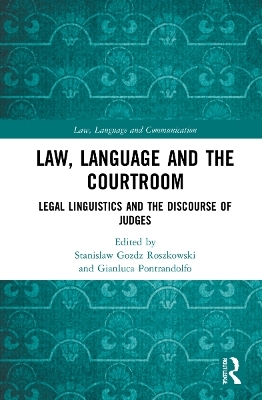
Law, Language and the Courtroom
Routledge (Verlag)
978-0-367-72188-6 (ISBN)
This book explores the language of judges. It is concerned with understanding how language works in judicial contexts. Using a range of disciplinary and methodological perspectives, it looks in detail at the ways in which judicial discourse is argued, constructed, interpreted and perceived. Focusing on four central themes - constructing judicial discourse and judicial identities, judicial argumentation and evaluative language, judicial interpretation, and clarity in judicial discourse - the book’s ultimate goal is to provide a comprehensive and in-depth analysis of current critical issues of the role of language in judicial settings. Contributors include legal linguists, lawyers, legal scholars, legal practitioners, legal translators and anthropologists, who explore patterns of linguistic organisation and use in judicial institutions and analyse language as an instrument for understanding both the judicial decision-making process and its outcome.
The book will be an invaluable resource for scholars in legal linguistics and those specialising in judicial argumentation and reasoning ,and forensic linguists interested in the use of language in judicial settings.
Stanisław Goźdź-Roszkowski is Associate Professor and Head of the Department of Specialised Languages and Intercultural Communication, University of Lodz (Poland), where he has been teaching various seminars in specialised communication and legal discourse analysis. His research focuses on functional and corpus-based approaches to the study of judicial discourse in US and Polish courts. He has published widely in the area of variation in legal language, legal phraseology and communicating evaluative meanings in judicial opinions. He is now involved in researching legal argumentation in the justification of judicial decisions. Gianluca Pontrandolfo holds a PhD in translation and interpreting studies. He is currently Senior Research Fellow at the University of Trieste (Italy) in the Department of Legal, Language, Interpreting and Translation Studies (IUSLIT), where he lectures on specialised translation from Spanish into Italian. His research interests include corpus linguistics, legal phraseology, legal translation training, Languages for Special Purposes, genre analysis and corpus-assisted critical discourse studies. He has published widely in the area of legal and judicial discourse from a contrastive corpus-based perspective.
List of contributors
Foreword
Editors’ Introduction
PART I. CONSTRUCTING JUDICIAL DISCOURSE AND JUDICIAL IDENTITIES
1. The judicial English Eurolect: a genre profiling of CJEU judgments
2. Evidentiality in US Supreme Court opinions: focus on passive structures with say and tell
3. Standardisation in the judicial discourse: the case of the evolution of the French Arrêts de la Cour de Cassation and the use of forms in European procedural law
4. The consensus case law of the European Court of Human Rights in light of the Court’s legitimacy over time: a corpus-linguistic perspective
5. Spider Woman beats Hulk: Baroness Hale and the prorogation of Parliament
PART II. JUDICIAL ARGUMENTATION AND EVALUATIVE LANGUAGE
6. Making a corpus-linguistic U-turn in multilingual adjudication
7. Evaluative language and strategic manoeuvring in the justification of judicial decisions: the case of teleological-evaluative argumentation
8. "Without proof of negligence or a causative connection": on causal argumentation in the discourse of the Supreme Court of Ireland’s judgments on data protection
9. A corpus-based comparative analysis of the evaluative lexicon found in judicial decisions on immigration
PART III. JUDICIAL INTERPRETATION
10. Pedagogies of context: language ideology and expression rights at the European Court of Human Rights
11. Free speech, artistic expression and blasphemy laws within the ECHR margin of appreciation
12. The US Supreme Court’s language of racism
13. Do the words of the American Constitution still matter? The question of "the meaning of meaning" in current judicial argumentation
14. How interdisciplinarity could improve the scientific value of legal studies of international judicial decisions
PART IV. CLARITY IN JUDICIAL DISCOURSE
15. Conveying the right message: principles and problems of multilingual communication at the European Court of Human Rights
16. Concision and Clarity in Italian Court Proceedings
Index
| Erscheinungsdatum | 04.11.2021 |
|---|---|
| Reihe/Serie | Law, Language and Communication |
| Zusatzinfo | 33 Tables, black and white; 7 Line drawings, black and white; 7 Illustrations, black and white |
| Verlagsort | London |
| Sprache | englisch |
| Maße | 156 x 234 mm |
| Gewicht | 399 g |
| Themenwelt | Schulbuch / Wörterbuch ► Wörterbuch / Fremdsprachen |
| Geisteswissenschaften ► Sprach- / Literaturwissenschaft ► Anglistik / Amerikanistik | |
| Geisteswissenschaften ► Sprach- / Literaturwissenschaft ► Literaturwissenschaft | |
| Geisteswissenschaften ► Sprach- / Literaturwissenschaft ► Sprachwissenschaft | |
| Recht / Steuern ► Allgemeines / Lexika | |
| Recht / Steuern ► Arbeits- / Sozialrecht ► Sozialrecht | |
| Recht / Steuern ► EU / Internationales Recht | |
| ISBN-10 | 0-367-72188-0 / 0367721880 |
| ISBN-13 | 978-0-367-72188-6 / 9780367721886 |
| Zustand | Neuware |
| Informationen gemäß Produktsicherheitsverordnung (GPSR) | |
| Haben Sie eine Frage zum Produkt? |
aus dem Bereich


